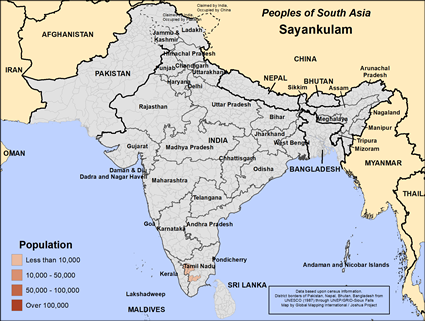The Tamil-speaking Hindu Sayankulam people live in Tamil Nadu, India. Historically, they have been involved in agriculture and small-scale trade, contributing to the local economy through farming and related activities. Over time, the Sayankulam people have adapted to the economic changes in the region, but many continue to rely on agriculture and trade for their livelihood.
The Sayankulam people primarily engage in farming, cultivating crops such as rice, millet and vegetables. They work closely with the land, following the seasonal patterns of planting and harvest. In addition to farming, some families participate in small-scale trade, selling produce and goods in local markets. The community works together, with families often sharing responsibilities in farming and household management.
Sayankulam villages are tightly-knit, with homes constructed from locally available materials such as brick, mud and thatch. Daily life revolves around farming, family obligations and religious practices. While younger generations seek education and job opportunities in nearby towns, many remain connected to their agricultural roots, contributing to their families during busy farming seasons.
The Sayankulam people practice Hinduism, worshiping deities like Vishnu, Shiva and local gods linked to nature and agriculture. Religious festivals such as Diwali, Pongal and Tamil New Year hold great importance in their community, marking key moments in the agricultural cycle. These festivals bring families together for prayer, celebration and offering thanks for successful harvests.
Temples and shrines play a central role in the religious life of the Sayankulam people, where they perform rituals and offer prayers for prosperity, health and protection. The religious practices are deeply intertwined with their agricultural lifestyle, with rituals often aimed at ensuring a good harvest and the well-being of livestock.
The Sayankulam people face several challenges, particularly in terms of economic development, education and healthcare. Many still rely on traditional farming methods, which leaves them vulnerable to environmental changes such as droughts and fluctuating crop yields. Access to modern farming techniques, irrigation systems and sustainable practices would help improve their livelihoods and economic stability.
Education is another significant need in the Sayankulam community. While some children attend local schools, access to quality education remains limited in rural areas. Expanding educational resources would provide the younger generation with opportunities for alternative careers and upward mobility.
Healthcare services are also insufficient, with many families traveling long distances to access basic medical care. Improving healthcare infrastructure in their villages and making services more accessible would greatly benefit the overall well-being of the Sayankulam people.
Pray for many from the Sayankulam people to understand both God's judgment and his majestic glory and goodness.
Pray for Tamil speaking workers to go to the Sayankulam people and for their hearts to be ready to receive their savior.
Pray for a chain reaction of families reaching families that result in thousands of new disciples who share their faith with others.
Pray for grace and truth expanding into their entire society as all believers learn to love others.
Scripture Prayers for the Sayankulam in India.
Ethnologue: Languages of the World
Reports from Indian NGOs on rural communities in Tamil Nadu
Academic research on agricultural and rural development in southern India
| Profile Source: Joshua Project |











